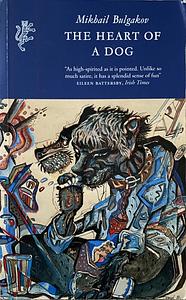You need to sign in or sign up before continuing.
Take a photo of a barcode or cover
devilishly hilarious and thought-provoking if limited compared to The Master and Margarita...
funny
fast-paced
Plot or Character Driven:
A mix
Strong character development:
Yes
Loveable characters:
No
Diverse cast of characters:
No
Flaws of characters a main focus:
Yes
challenging
dark
reflective
sad
tense
medium-paced
Plot or Character Driven:
Character
Strong character development:
Complicated
Loveable characters:
No
Diverse cast of characters:
Yes
Flaws of characters a main focus:
Yes
Very different to anything I’ve read before. So it was a struggle, but a good one! Really quite dark, but intriguing.
Meh..i expected a lot more with dog becoming human and experiencing the life as a human and tackling the challenges but instead we got a dog turning into a SOB and bascially no understanding from the professor, doctor and generally the whole public.
funny
fast-paced
Plot or Character Driven:
Character
Strong character development:
Complicated
Loveable characters:
No
Diverse cast of characters:
No
Flaws of characters a main focus:
Complicated
Graphic: Animal cruelty, Body horror, Medical content
Moderate: Gun violence, Self harm, Medical content, Alcohol, Sexual harassment, Injury/Injury detail
Minor: Transphobia
"The whole horror of the situation is that he now has a human heart, not a dog's heart. And about the rottenest heart in all creation!"
adventurous
dark
funny
tense
fast-paced
Plot or Character Driven:
A mix
Strong character development:
Yes
Loveable characters:
No
Diverse cast of characters:
Yes
Flaws of characters a main focus:
Yes
‘Daarna krabde hij zijn achterhoofd en kon ik een nieuw, zeer duidelijk uitgesproken woord noteren: “Bourgeois.”’
Sharik, a homeless mongrel, lies blistered and dying in the Moscow snow, when a kindly stranger offers him a horse meat sausage and a new home, though, as the unsuspecting Sharik finds out, there are some pretty sinister strings attached.
The stranger turns out to be Philip Phillopovich, professor of medicine, who waxes lyrical on the loss of freedoms and luxuries under Soviet rule over snow-chilled caviare and fine wines. He is the antithesis of the blue clad housing committee who Bulgakov paints with the affection one usually affords an abscess.
Philip Phillopovich is a character reminiscent of Victor Frankenstein; in his egotism, his disregard for the suffering of his subjects, and his unchecked self-grandisment through gratuitous medical practice, about which he shows no moral qualms. The Professor is monstrous, what he does to Sharik is highly disturbing and, like Dr Frankenstein, though he is successful, he is rather unhappy with the results of his experiment.
As in the Master and Margarita, Bulgakov gives a wonderful, kinetic nature to his characters in absurd, often fevered, prose. The tale is told initially from Sharik's perspective, moving into an epistolary narrative in the form of medical records and observations of the professor's assistant, Dr Bolmenthal, finally the story is handed over to an omnipotent narrator. This change in perspective keeps the pace at a sprint through most of the novella and brings us gasping to the fate which is perhaps most favourable for poor Sharik.
Bulgakov places egalitarian austerity beside old school opulence in grotesque, frothing prose. It is a rant and rants are always enjoyable., especially if they are Russian. The gorily painted allusions to conflict in post-revolutionary society that Bulgakov crams into this short book makes it a brilliantly juicy read. It is satire with a bite that, even now, reads as fresh observation on the nature of totalitarianism.
The stranger turns out to be Philip Phillopovich, professor of medicine, who waxes lyrical on the loss of freedoms and luxuries under Soviet rule over snow-chilled caviare and fine wines. He is the antithesis of the blue clad housing committee who Bulgakov paints with the affection one usually affords an abscess.
Philip Phillopovich is a character reminiscent of Victor Frankenstein; in his egotism, his disregard for the suffering of his subjects, and his unchecked self-grandisment through gratuitous medical practice, about which he shows no moral qualms. The Professor is monstrous, what he does to Sharik is highly disturbing and, like Dr Frankenstein, though he is successful, he is rather unhappy with the results of his experiment.
As in the Master and Margarita, Bulgakov gives a wonderful, kinetic nature to his characters in absurd, often fevered, prose. The tale is told initially from Sharik's perspective, moving into an epistolary narrative in the form of medical records and observations of the professor's assistant, Dr Bolmenthal, finally the story is handed over to an omnipotent narrator. This change in perspective keeps the pace at a sprint through most of the novella and brings us gasping to the fate which is perhaps most favourable for poor Sharik.
Bulgakov places egalitarian austerity beside old school opulence in grotesque, frothing prose. It is a rant and rants are always enjoyable., especially if they are Russian. The gorily painted allusions to conflict in post-revolutionary society that Bulgakov crams into this short book makes it a brilliantly juicy read. It is satire with a bite that, even now, reads as fresh observation on the nature of totalitarianism.



